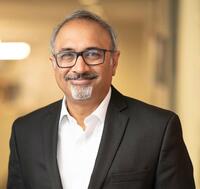Date:
Location:
The Science Transforming How We Learn  Sanjay Sarma, PhD
Sanjay Sarma, PhD
Vice President for Open Learning at MIT
Fred Fort Flowers (1941) and Daniel Fort Flowers (1941) Professor of Mechanical Engineering at MIT
RSVP
How do we learn and how can we learn better? How can we channel knowledge from the science of learning to unlock the true potential of our learners?
Sanjay Sarma will explore the history of modern education, tracing the way in which traditional classroom methods—lecture, homework, test, repeat—became the norm and showing why things need to change. He will take us from fundamental neuroscience to cognitive psychology and beyond, as he considers the future of learning. He will introduce us to scientists who study forgetting, exposing it not as a simple failure of memory but as a critical weapon in our learning arsenal. He will examine the role curiosity plays in promoting a state of “readiness to learn” in the brain. And he will delve into how such ideas are being put into practice in the real world with a vision for learning that's inclusive and democratic.
Drawing from his experience as an educator and the work of researchers and educational innovators at MIT and beyond, Sanjay Sarma will offer scientific and practical insight, promising not just to inform but to open minds.
Biography:
Sanjay Sarma is the Vice President for Open Learning at MIT, which includes the Office of Digital Learning, the MIT Integrated Learning Initiative and the Abdul Latif Jameel World Education Lab. He is also the Fred Fort Flowers (1941) and Daniel Fort Flowers (1941) Professor of Mechanical Engineering at MIT.
A co-founder of the Auto-ID Center at MIT, Sarma developed many of the key technologies behind the EPC suite of RFID standards now used worldwide. He was the founder and CTO of OATSystems, which was acquired by Checkpoint Systems (NYSE: CKP) in 2008, and he has worked at Schlumberger Oilfield Services in Aberdeen, UK, and at the Lawrence Berkeley Laboratories in Berkeley, California. His research includes sensors, the Internet of Things, cybersecurity and RFID.
From 2010 through 2012, Sarma was Director of the MIT alliance with Singapore University of Technology and Design, which developed and implemented a forward-looking engineering and design curriculum. Leveraging innovation and ideas, Sarma went on to co-chair MIT’s Taskforce on the Future of Education, and subsequently was charged with implementing the recommendations around digital learning.
Since 2012, Sarma has served as MIT’s Director of Digital Learning, Dean for Digital Learning and now Vice President of Open Learning. In these roles, he has led the creation of the MicroMasters® program credential, developed the MIT Integrated Learning Initiative, founded the Jameel World Education Lab, and created a group that seeks to transform teaching and learning throughout the world, through research, curriculum development, community building and innovative learning offerings.
Currently, Sarma serves on the board of edX, the not-for-profit company founded by MIT and Harvard to create and promulgate an open-source platform for the distribution of free online education worldwide, as well as the boards of GS1, EPCglobal, and several startup companies including Hochschild Mining and Top Flight Technologies. He also advises several national governments and global companies.
Author of more than 200 academic papers in computational geometry, sensing, RFID, automation, CAD, learning engineering, the science of learning and education reform, Sarma has two upcoming books: one on the science of learning and a second on the future of work. Sarma is the recipient of numerous awards for teaching and research, including the MacVicar Fellowship, Business Week’s eBiz Award, and InformationWeek's Innovators and Influencers Award. He received his bachelor’s degree from the Indian Institute of Technology, his master’s degree from Carnegie Mellon University, and his PhD from the University of California at Berkeley.
